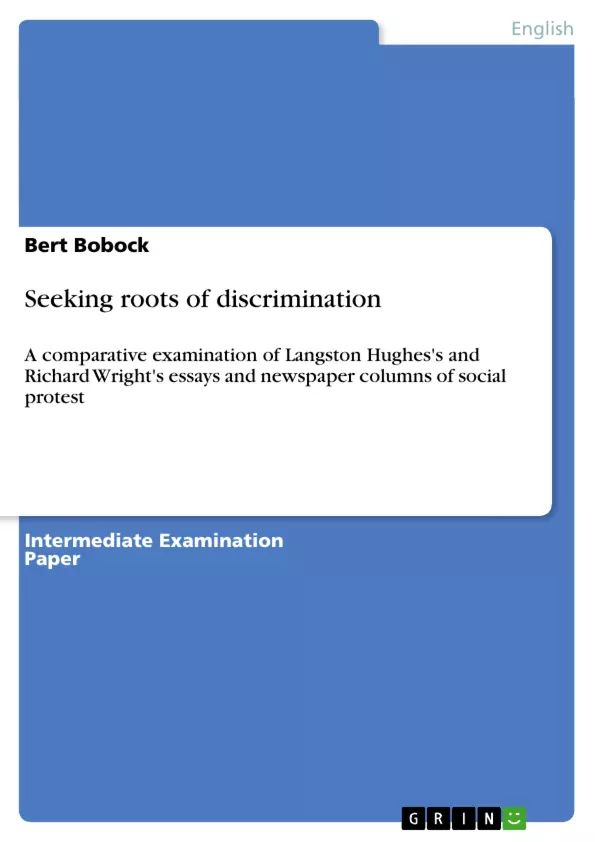Although much of Langston Hughes's and Richard Wright's writing expressed social protest, there is one genre —the essay— that has gone largely unnoticed.
In the eyes of Hughes and Wright, custom, tradition and religion may be seen as some of the root causes of racism because they are largely interiorized, but they by far cannot serve alone as satisfying explanations for it. Important in the creation of racism is e.g. the negative projection of colored people in the media. Consequently, this forms a fatal preconception of blacks that is constantly being reproduced. Langston Hughes and Richard Wright, among the most prolific of American writers,
gained international attention and acclaim in nearly every genre of writing, including
poetry, the short story, the novel, drama, the libretto, the autobiography, journalistic
prose, children's and adolescent literature and song lyrics. Although much of their
writing, often expressing social protest, was easily accessible to scholars and general
readers, there is one genre —the essay— that has gone largely unnoticed. Yet such
essays and short, non-fiction passages contribute significantly to Hughes’s and
Wright’s work, striving for racial equality on a local level, a national, as well as global
levels.
At first glance, it may appear fruitless to compare the non-fiction works of
Hughes and Wright, since the writers became famous for their poetry and fictional
masterpieces. Also, a comparison between Wright’s rather epic artistic style and
Hughes’s dense, often ironic prose may seem unlikely and difficult. Yet, on closer
inspection, you will find that both writers are surprisingly close to one another in their
way of thinking, and their conclusions often overlap.
Hughes was a columnist for the famous African-American newspaper, the
“Chicago Defender,” where he commented on contemporary issues and chronicled
the hopes and despairs of his people. In spite of the different origins of the writers,
Hughes and Wright were confronted early on with race discrimination and
segregation, publicly know as “Jim Crow-ism1,” which was identified and condemned
in their essays.
Inhaltsverzeichnis (Table of Contents)
- Introduction
- Why and Wherefore
- Methodological Reflection
- Types of Discrimination
- Common Denominators
- Root Causes
- Breaking the Cycle of Discrimination
Zielsetzung und Themenschwerpunkte (Objectives and Key Themes)
This paper examines the essays of Langston Hughes and Richard Wright, two prominent African-American writers, to explore the roots of discrimination and the struggle for racial equality in the 1930s. The authors' essays, often overlooked, offer valuable insights into contemporary social issues, exposing the systemic nature of discrimination and its impact on individuals and society.
- The historical context of discrimination in the United States during the 1930s.
- The common denominators and root causes of discrimination identified by Hughes and Wright.
- The authors' perspectives on the interplay of race, class, and freedom in a capitalist system.
- The stylistic approaches used by Hughes and Wright to convey their ideas on social injustice.
- The challenges and potential strategies for breaking the cycle of discrimination.
Zusammenfassung der Kapitel (Chapter Summaries)
- Introduction: This chapter introduces the focus of the paper, examining the essays of Langston Hughes and Richard Wright as a source of understanding social protest and the fight for racial equality in the 1930s. The authors' background, writing styles, and shared experiences with discrimination are highlighted.
- Why and Wherefore: This section delves deeper into the authors' biographical context, explaining how their lived experiences shaped their writing and their commitment to social justice. It also explores how Hughes and Wright, despite coming from different backgrounds, reached similar conclusions about the pervasiveness of discrimination.
- Methodological Reflection: This section outlines the methodological approach used in the paper, emphasizing its focus on cultural studies and its aim to analyze the core problems addressed by Hughes and Wright in their essays. It further details the steps involved in understanding these problems, exploring their root causes, and examining the mechanisms of discrimination reproduction.
Schlüsselwörter (Keywords)
The key themes and concepts explored in this paper include social protest, racial discrimination, Jim Crow, American culture, the Great Depression, capitalist system, socialist ideologies, freedom, and the reproduction of discrimination processes. Through an analysis of the essays by Langston Hughes and Richard Wright, the paper examines the complex interplay of these issues and their enduring relevance in understanding the challenges and possibilities of achieving racial equality.
Frequently Asked Questions
How did Langston Hughes and Richard Wright address discrimination?
Both writers used their essays and columns to comment on contemporary social issues, chronicling the hopes and despairs of African Americans under segregation.
What are the root causes of racism according to these authors?
They identified custom, tradition, religion, and the capitalist system as root causes, alongside the negative projection of colored people in the media.
What was "Jim Crow-ism"?
It refers to the systemic racial discrimination and segregation laws in the United States that Hughes and Wright condemned in their non-fiction works.
Why are their essays often overlooked?
Most scholars focus on their famous poetry and novels, but their essays provide crucial insights into their striving for local and global racial equality.
How does the media influence the reproduction of racism?
The media creates fatal preconceptions by constantly reproducing negative stereotypes of black people, which then becomes interiorized by society.
- Citar trabajo
- Bert Bobock (Autor), 2002, Seeking roots of discrimination, Múnich, GRIN Verlag, https://www.grin.com/document/94623



